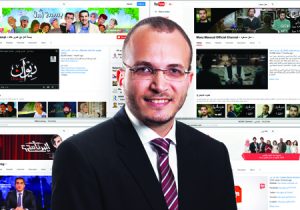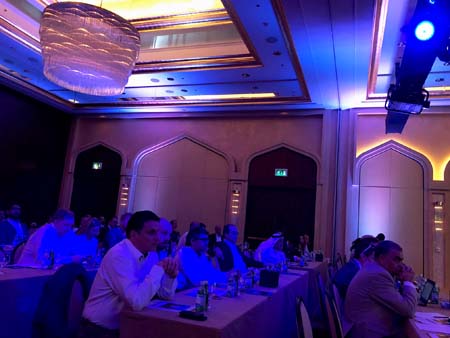The Arab region has seen a massive surge in the production of digital content for online platforms, which are increasingly competing with satellite TV. Vibhuti Arora speaks to Egyptian MCN Diwan Vidoes on how online content is breaking new ground The Arab region has experienced a revolution of sorts in the digital arena, with more […]
The Arab region has seen a massive surge in the production of digital content for online platforms, which are increasingly competing with satellite TV. Vibhuti Arora speaks to Egyptian MCN Diwan Vidoes on how online content is breaking new ground

The Arab region has experienced a revolution of sorts in the digital arena, with more content being delivered on tablets and smartphones in recent years. Cisco has predicted that video will account for 69% of all consumer internet traffic and Video on Demand (VOD) will treble in the next couple of years. One of the key contributors to this online revolution has been YouTube. As YouTube celebrates its tenth anniversary this year, the video-sharing website is looking at the Middle East as a region with immense potential to embrace online content.
This paradigm shift has led to newer business models, with major broadcasters branching out into the digital realm. The growing demand for online content has also spawned a new genre of content development companies that produce media assets exclusively for online platforms. These multi-channel networks (MCNs) are a growing force in the region. Companies such as Diwan Videos, Uturn, Kharabeesh and the newly launched Qubba are household names now, and their programmes are increasingly seen as competing with regional satellite TV.
Six years ago, when Diwan Videos was launched in Cairo, online platforms were seen as secondary outlets for content that was primarily aired on television.
We started as aggregators and signed up major broadcasters and content owners under our MCN to take care of the copyrights, monetising and so on, says Ossama Youssef, founder and CEO of Diwan Videos.
Back then, clients only wanted to have their content protected and there was some live streaming. We had the know-how to manage content on YouTube then.
Diwan had the early mover advantage in Egypt and was quick to sign up big names to offer its services. Today, original programming is a new but quickly growing segment of online video that includes entertainment content created specifically for an online audience. However, many of the mediums early successes have been driven by content tied to traditional TV programming.
We signed Sono Cairo as one of our first clients. The Egyptian government owns all the archives for TV content, and our job was to digitise this big portfolio of content for Sono Cairo and make it available on YouTube. We did the same for the childrens TV network Toyor Aljannah, developing it into one of the biggest YouTube channels in MENA in terms of viewers. Diwan Videos was also behind the successful YouTube management of the political satire Al Bernameg, which was the first YouTube channel to achieve one million subscribers in the MENA. While we still aggregate content, we began to produce original content as well, knowing very well that the dynamics of TV viewing were shifting, comments Youssef.
As a YouTube Partner, Diwan Videos follows a revenue-sharing business model. Diwan Videos initially launched with YouTube Spain in 2009 because the video sharing platform did not have a partner programme in the Arab region then. YouTube announced the expansion of its partner programme in 2012 to include Egypt, Saudi Arabia and the UAE. This allowed users in these countries to generate revenue depending on the number of views their uploaded videos received.
Diwan Videos also has partnerships with Dailymotion, a video sharing website and Vuclip, a mobile platform from India. Based on the clients requirement and contract agreements, the content is distributed to various online platforms.
The company now has offices in Cairo and Dubai. The Dubai office was opened with the objective of expanding regionally and internationally. The MCN currently handles content for Turkey, India and some countries in Africa, and is seeking clients from Europe as well.
We specialise in copyright and legal issues and provide the clients with a full set of digital solutions for mainly three types of content for live streaming, original programming and branded content, explains Youssef.
Original videos were short to begin with, mostly up to five minutes on YouTube, but it appears that viewers prefer longer clips now.
A full episode of Al Bernameg was 55 minutes, we used to divide it into segments of about one, two or three and then the full episode, and realised that the viewership for the full episodes was much more. People prefer to watch full episodes. If they like it, they will watch it.
Youssef adds that his company offers spiritual content, especially from Sono Cairo, which owns the Koran recitals of well-known personalities, and that this content is popular the world over. In fact, Diwans offerings have viewers from Malaysia to the US, with more than 40% of viewers residing outside the Middle East.
The MCN has now aggregated eight billion views and 24 billion watch minutes and its viewers include Arab and Muslim expats all over the world, who want to connect with their home.
There are talk shows, live streaming of political commentary and programmes from TV networks that are not available in these countries. Diwans services enable Arab expats to watch these shows on OTT media.
Diwan ranks among the top 100 global YouTube MCNs in terms of subscribers and views. It is also the first MCN in the region to have signed up for a new offering where YouTube lets the MCN pitch the content directly to the clients for ads. Youssef says that YouTube is very scalable, and the reason for its success is that it has evolved with time.
There was no live streaming on YouTube earlier, which we have now. The platform has also introduced 4K and 3D content. It is now considering ad-free content based on the subscription model, which has already taken off quite successfully in the US, he explains.
Digital is already competing with linear TV, and is likely to take over in the next five years or so, predicts Youssef.
One of the challenges that we face today is illegal downloading of content. Even bigger players take content from online sources and ingest it, which clearly conflicts with our interests. We can counter this by using technology such as content ID fingerprint.
In 2010, we used to apply 100% content ID fingerprint to try as much as possible to avoid infringement, but following up on infringement cases takes a lot of energy and resources, he adds.
Digital has much more potential to open newer revenue streams, according to Youssef, who says that spending on digital is not at par and doesnt tap the full potential of the medium.
We have not monetised digital media to its fullest. The digital spend on ads needs to go up, especially in the Arab region. We have to come up with a creative way to monetise it.
Product placement in videos is one way of giving visibility to a product. Creating mobile apps for YouTube content that have a substantial fan base also works well, according to Youssef.
With more than 400 clients, DiwanVideos is furthering its digital content management services in the region by offering new means of channel optimisation and copyright protection. The company has also developed custom-built revenue reports in the DiwanVideos Management Tool a platform that allows clients to view statistics and analysis of the performance of their channels as well as videos and generated revenues.








































































